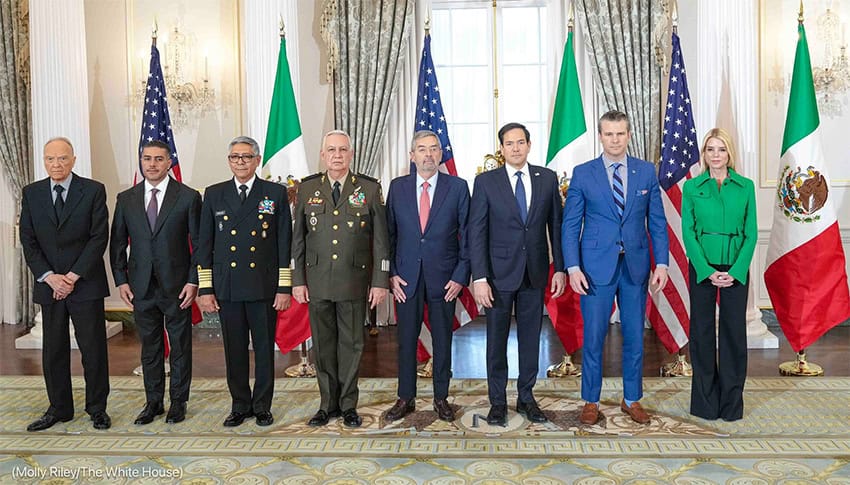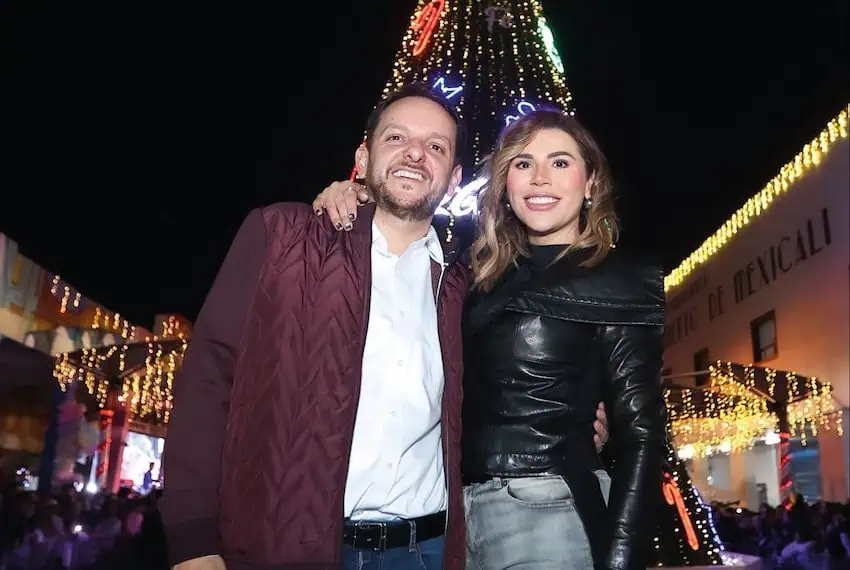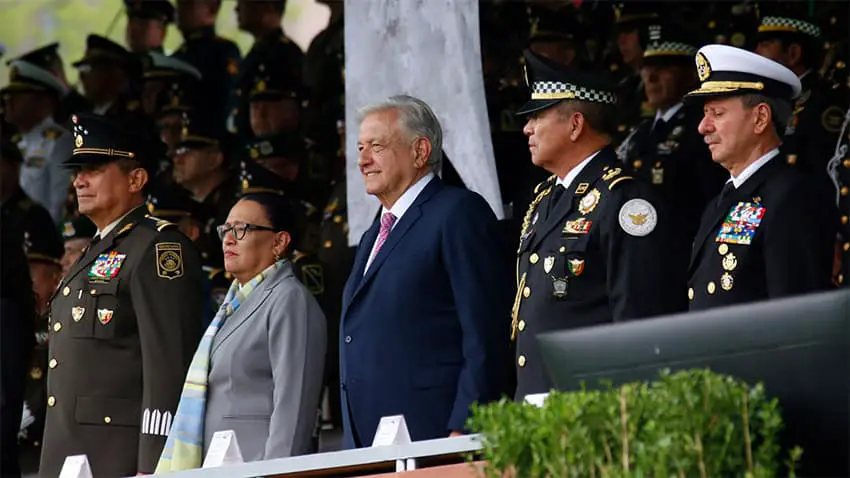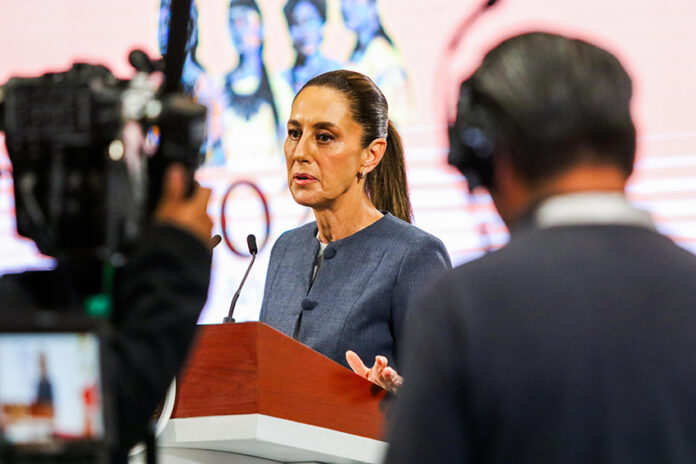Is the United States pressuring Mexico to investigate and prosecute politicians with suspected links to criminal organizations?
Does the United States government have a so-called “narco-list” of Mexican politicians it believes have ties to organized crime?
The focus on these questions has intensified over the past month since Baja California Governor Marina del Pilar Ávila revealed that the United States had revoked tourist visas for her and her husband, Carlos Torres Torres.
Now, Reuters has reported that the Trump administration is indeed pressuring Mexico to go after politicians with suspected narco ties, but Mexico’s Foreign Affairs Ministry (SRE) and President Claudia Sheinbaum denounced the news agency’s reporting as “completely false.”
That the United States believes there are corrupt officials in Mexico with links to drug cartels is nothing new. Indeed, the White House made the daring assertion in February that that “the Mexican drug trafficking organizations have an intolerable alliance with the government of Mexico.”
“The government of Mexico has afforded safe havens for the cartels to engage in the manufacturing and transportation of dangerous narcotics, which collectively have led to the overdose deaths of hundreds of thousands of American victims,” the White House said in a “fact sheet” on tariffs.

Meanwhile, twice in the past eight days the United States Embassy in Mexico has felt it was necessary to publicly debunk “narco-lists” circulating on social media.
Reuters: Mexico under pressure to investigate corrupt politicians
Citing “sources familiar with the matter,” Reuters reported that “the Trump administration is pressuring Mexico to investigate and prosecute politicians with suspected links to organized crime, and to extradite them to the United States if there are criminal charges to answer there.”
The news agency said that the U.S. “requests” were raised at least three times by Secretary of State Marco Rubio and his team in bilateral meetings and conversations with Mexican officials. The “list of Marco” or “Marco’s list” is an alternate name for the alleged U.S. list of Mexican politicians with suspected organized crime ties.
Citing “four people familiar with the matter,” Reuters said that the U.S. requests “seek to push President Claudia Sheinbaum’s government to investigate current elected officials and launch an unprecedented crackdown on narco corruption.”
The news agency said that it was told by two of its sources that U.S. officials “have called for action against several politicians from Sheinbaum’s own Morena party and threatened to levy further tariffs if Mexico did not take action.”
Reuters also reported that two sources said that “five current Morena officials and one former senator were mentioned” during conversations between U.S. and Mexican officials “including Baja California Governor Marina del Pilar Ávila.”

Again citing its sources, the news agency said that the United States government first raised its request about the investigation and prosecution of Mexican officials at a meeting in Washington on Feb. 27 attended by Rubio, Mexican Foreign Minister Juan Ramón de la Fuente, U.S. Attorney General Pam Bondi, Mexican Attorney General Alejandro Gertz, Mexican Security Minister Omar García Harfuch and other officials.
Citing an unnamed member of Sheinbaum’s security cabinet, Reuters said that a “crackdown” on Mexican politicians with suspected links to organized crime “carries political risks” for the president “as some of the allegations involve members of her own party.”
In its report, Reuters also said it “could not determine if the U.S. provided Mexico with a list of politicians suspected of links to organized crime, or evidence against them.”
It also said it was not “able to independently confirm if any individuals flagged by the U.S. had engaged in any wrongdoing.”
Ávila has rejected claims of wrongdoing, including reports that she is under investigation for links to a money laundering network. She has asserted that the revocation of her visa was “an administrative decision, not an accusation.”
Like his wife, Carlos Torres Torres is a Morena party politician. He has served as a deputy in both the federal Congress and the Baja California Congress.

Sheinbaum has defended Ávila as questions linger over why the governor’s U.S. visa was revoked.
Sheinbaum responds to the report
Mexico’s Foreign Affairs Ministry responded to the Reuters report in a social media post on Wednesday.
“Both the Mexican Foreign Affairs Ministry and the United States Department of State have given transparent accounts of the various conversations held between the two countries on various issues, including security,” the SRE said.
“It is completely false that requests were made to investigate, prosecute, or extradite any official from Mexico in the meetings held with Secretary Rubio or with his team from the State Department,” the ministry said.
“The conversations have revolved around the search for agreements on various issues based on the principles of sovereignty, coordination without subordination, and respect for human rights,” the SRE said.
Sheinbaum also described the information in the Reuters report as “completely false.”
Claudia Sheinbaum (@Claudiashein) calificó como “falsa” la nota de Reuters que señala que EU pidió a México investigar a políticos mexicanos con presuntos vínculos con el crimen.
“¿No les parece extraño que cuando estamos en la reunión (con Landau) sale la nota? ¿De dónde sale… pic.twitter.com/1tQV353f1n
— Emeequis (@emeequis) June 12, 2025
“Don’t you think it’s strange that when we were in the meeting [with U.S. Deputy Secretary of State Christopher Landau” an article came out … saying that they were asking us to give them names of Mexican politicians. There is nothing more false than that,” she told reporters at her Thursday morning press conference.
“But the question is where does the [information in the] article come from?” Sheinbaum asked before describing the content of the Reuters report as “completely false.”
She said that the United States “didn’t ask for anything” at her meeting on Wednesday with Landau and U.S. Ambassador to Mexico Ron Johnson, which came ahead of expected bilateral talks between Sheinbaum and U.S. President Donald Trump during next week’s G7 Summit in Canada.
The US Embassy denounces another ‘narco-list’
The United States Embassy in Mexico denounced on Wednesday an “initial list” of politicians with alleged criminal links posted to social media by Simón Levy, an entrepreneur and former deputy tourism minister in the government of Andrés Manuel López Obrador.
“WARNING. This information is false,” the embassy said in a post to X that showed Levy’s list superimposed with the word “FALSO” in red.
Earlier on Wednesday, Levy announced on X that he would reveal the names of “Mexican politicians, governors and politically exposed people” who are subject to arrest warrants in the United States due to their alleged links to “organized crime, money laundering and drug trafficking.”
🚨 ADVERTENCIA 🚨
Esta información es falsa. pic.twitter.com/DlcnTyQAMa— Embajada EU en Mex (@USEmbassyMEX) June 11, 2025
The eight names on his “initial list” included Tamaulipas Governor Américo Villareal, Sinaloa Governor Rubén Rocha Moya and former Morelos governor and soccer star Cuauhtémoc Blanco. It also included former Federal Electricity Commission director Manuel Bartlett and Andrés Manuel López Beltrán, son of former president López Obrador and Morena’s secretary of organization.
Levy claimed, without citing any source, that those five men and three others face charges related to “huachicol,” or fuel theft.
His claim came a day after The Financial Times published a report headlined “How smuggled US fuel funds Mexico’s cartels.”
In the report, The Financial Times said that “under pressure from the Trump administration, Mexico’s President Claudia Sheinbaum is trying to crack down on illegal fuel imports.”
“But the cartels’ connections to the authorities, as well as the huge sums to be made, mean that they have the protection and incentive to continue,” the report said.
The United States Embassy’s denunciation of Levy’s list as “false” came eight days after it labeled as “false” a supposed U.S. government statement that purported to identify various “political leaders in Mexico with ties to drug cartels.”
Asked about Levy’s list on Thursday, Sheinbaum said “this person is not worth talking about.”
Other media outlets fuel speculation
Citing unnamed United States officials, the U.S. investigative journalism organization ProPublica reported on May 15 that “the Trump administration has begun to impose travel restrictions and other sanctions on prominent Mexican politicians whom it believes are linked to drug corruption.”
“So far, two Mexican political figures have acknowledged being banned from traveling to the United States,” ProPublica said, referring to Governor Ávila and her husband.
“But U.S. officials said they expect more Mexicans to be targeted as the administration works through a list of several dozen political figures who have been identified by law enforcement and intelligence agencies as having ties to the drug trade. The list includes leaders of President Claudia Sheinbaum’s governing party, several state governors and political figures close to her predecessor, former President Andrés Manuel López Obrador, the U.S. officials said.”

In response to the ProPublica report, Sheinbaum said that its author, journalist Tim Golden, “already has a history of providing information without sources.”
She also said that her government wouldn’t “protect anyone linked to organized crime as long as there is proof.”
A few days before ProPublica published its report, journalist Salvador García Soto wrote in a column for the newspaper El Universal that the Trump administration, “through its powerful Secretary of State Marco Rubio has commenced the ‘hunt’ for Mexican politicians, which, according to their investigations, have links to drug trafficking.”
García asserted that the Department of State has a so-called “list of Marco” that includes “at least 44 names of prominent officials and politicians” from Mexico with alleged links to drug trafficking, including federal ministers, governors, mayors and lawmakers.
He wrote that the list includes “politicians from all existing parties in Mexico,” but “the majority of those mentioned are active members of Morena, the party of President Sheinbaum, and some have a very close relationship with her and with the ex-president López Obrador.”
Asked on May 15 about a supposed U.S. “narco-list,” that includes the names of “narcogobernadores” (narco-governors) and other officials, Sheinbaum responded:
“There are a lot of rumors. They are rumors.”
She said at the time that her government had not received any notification from the United States government about the existence of “lists” of politicians with links to drug cartels.
With reports from Reuters
